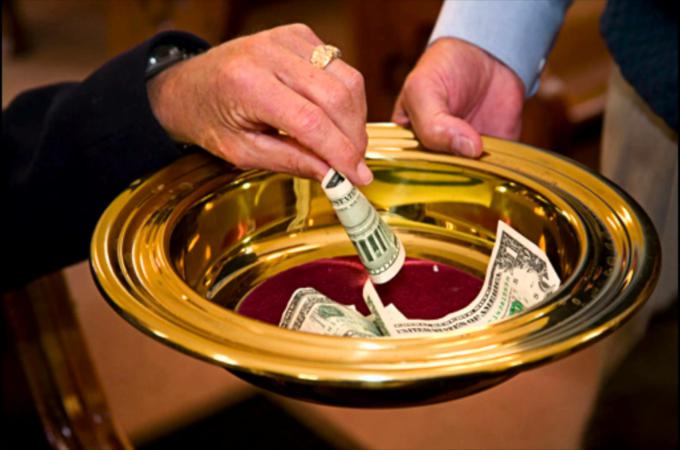Catholics and tithing
Q. We have a new pastor who several times already has brought up the notion of tithing. He says that, as Catholics, we are called to give 10 percent of our annual gross income to charity, and he promises us that "God will not be outdone in generosity."
Can you explain the church's teaching on tithing: Is it really a requirement, like Sunday Mass attendance, that Catholics tithe? The Catechism of the Catholic Church simply says that the faithful "have the duty of providing for the material needs of the church, each according to his abilities" (No. 2043). I agree, but we also have to balance that against our responsibility to provide for the material needs of our children. (Minneapolis)
A. The practice of tithing was formally established in the Torah, the Jewish law of the Old Testament. A person offered to God, by giving to the Temple, one-tenth of the harvest of grain of the fields or the produce of fruit of the trees. That practice carried over into the early centuries of the church's history, and in the eighth century Charlemagne made tithing to the church a civil law.
Today there is no obligation for Catholics to donate a specific fraction of their income -- only, as you mention, the general obligation that all Catholics should, to the extent of their abilities, contribute to the material support of the church.
In addition to the passage you cite from the Catechism of the Catholic Church, the church's Code of Canon Law says that "the Christian faithful are obliged to assist with the needs of the church so that the church has what is necessary for divine worship, for the works of the apostolate and of charity" (Canon 222.1).
Studies have shown that Catholics typically give between 1 percent and 2 percent of their income to local parishes, but to that figure must be added the considerable donations made to religious orders as well as to Catholic hospitals and Catholic Charities, which make up the largest private network of health care and social service agencies in America.
Q. We live in a rural area with several small churches of various denominations. For many years during Lent and Advent, weekly ecumenical services have been held at different churches -- along with a large interfaith service at Thanksgiving and one in June as a baccalaureate for area high school graduates.
The former pastors of our Catholic parish always participated in these services, but our present priest is unwilling to do so. So my question is this: Is this a matter of official liturgical guidelines or one of personal preference?
Some Protestant neighbors have begun to ask why we no longer have Catholic representation. What do we tell them? (upstate New York)
A. The position of the church is that such services as you describe are definitely encouraged. The Vatican's 1993 Directory for the Application of Principles and Norms on Ecumenism say that "prayer in common is recommended for Catholics and other Christians so that together they may put before God the needs and problems they share" (No. 109).
So no priest has the option of declining to participate simply because it makes him feel uncomfortable. However, in fairness to your priest, I don't know your local situation and there could be other reasons for his reluctance.
Suppose, for example, that some Catholics were forgoing Sunday Mass during Advent and Lent, figuring that they were "covered" by the interfaith services. That would be a clear misunderstanding: The Mass is the highest form of worship, the one that puts us in closest touch with the divine and the one offered to us as a gift from Jesus himself. Not to mention the fact that Catholics have a serious religious obligation to share in the Eucharist weekly.
Why not arrange to sit down with your priest, perhaps with two or three other parishioners who share your concerns, and try to determine the reason for your pastor's reluctance. Following that, if you still were to conclude that it's because he simply "doesn't want to," then it might be opportune for you to write your bishop and offer the opinion that the absence of your pastor at such services is harming the reputation and work of the Catholic Church.
- - -
Questions may be sent to Father Kenneth Doyle at askfatherdoyle@gmail.com and 40 Hopewell St. Albany, N.Y. 12208.
- Father Kenneth Doyle is a columnist for Catholic News Service



















